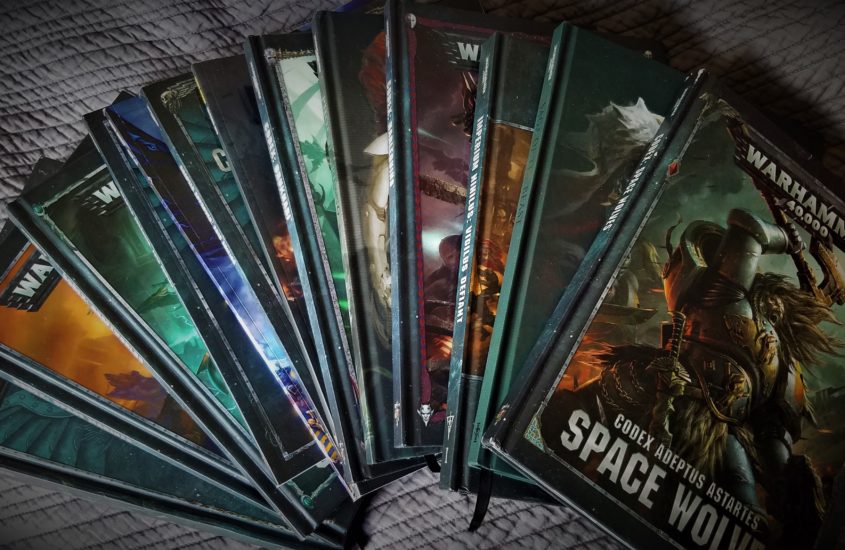Coach’s Corner: The Myth of Knowing Your Rules

There is a stigma in the Warhammer 40,000 community that “good players don’t have to look up their rules”. In today’s coach’s corner, I want to convince you that this is the wrong attitude and steer you towards a new ethos that is better for the game and you as a player.
There are 38 or so factions in Warhammer 40,000. Each faction has its own datasheets, special, rules, Strategems, warlord traits, relics, psychic powers, etc. Many players have played this game for years and still have not squared off against every army in the game. I bet there are units in your codex you have not even seen on the tabletop! The point is this game is vast and incredibly varied, so pretending to know everything is a mistake from the get-go.
“Well I know all the rules for my army!”
The most dangerous thing is not what you don’t know, but the things you think you know, that ain’t so. Ninth edition is right around the corner, bringing a host of changes to the game we’ve been playing for the last several years. You are at most risk of this with the rules for your own army. I’ve seen veteran players get rules wrong with lists they have played dozens of times! It is absolutely, 100% an honest mistake, but it is a testament to how complex the game really is. How can this happen? To answer that question we’ll we need to look inward (quite literally).
How does the brain work
For those of you that might not be well versed in cognitive psychology, your brain has a limited capacity for information at any given time and processes information by chunking information. To get a sense of what I mean answer the following question: which series of numbers is easier to memorize?
526452597 or 123456789
The second one, right? Chunking is essentially breaking information up into related groups. Your brain has chunked the series of numbers into information you already know, the order of the natural numbers. You memorize one rule letting you recreate the sequence, rather than brute-forcing 9 random numbers into long term memory, which is much harder and takes much longer to do.
As 40k players we make generalizations and memorize rules by their underlying concept. Take “ignores cover” for example. A fairly well experienced 40k player may tell you Imperial Fists have the ability to “ignore cover”. This is great chunking by your brain, but it is not the full picture as the actual rule for Siege Masters is as follows:
Siege Masters: When resolving an attack made with a ranged weapon by a model with this tactic, the target does not receive the benefit of cover to its saving throw.
How does this rule interact with the Ravenguard Chapter Tactic, Shadow Masters?
Shadow Masters: When resolving an attack made with a ranged weapon against a unit with this tactic by a model that is more than 12″ away, that unit is treated as having the the benefit of cover to its saving throw, and if that unit is not a VEHICLE and is entirely on or within a terrain feature, subtract 1 from the hit roll.
Thinking of the ability as “ignoring cover” is convenient until the actual details matter, and the devil is in those details. When attacking Ravenguard infantry in cover more than 12″ away, the -1 to hit modifier would still apply as they still count as being in cover.
This is just one example, but small interactions like this are all over the game. I personally have encountered this as well. Take the Prepared Positions stratagem. When it first debuted I read it and absorbed it as “give my units cover for the first turn”. At the time, that was a valid simplification for my Space Wolf army.
Then the Vanguard Units were released, and suddenly I had access to infiltrating units (SW scouts are elites and outflank instead of infiltrate)! I immediately started using Prepared Positions to protect my outflanking units when I got seized upon. It wasn’t until I was prompted by my good friend Jacob that I reread the stratagem.
Prepared Positions: Use this Stratagem at the start of the first battle round, before the first turn begins. Until the end of the first turn, all units from your army – other than TITANIC units, AIRCRAFT units and units with the Fortification or Flyer Battlefield Roles – that are wholly within your deployment zone receive the benefit of cover, even while they are not entirely on or in a terrain feature. A unit that is already receiving the benefit of cover gains no additional benefit from this Stratagem.
I never had cause to think about units outside of my deployment zone before, so I had not emphasized understanding that part of the stratagem. As a result, I had been playing it incorrectly for about 2 months. Even the best players make these types of rules mistakes, so it is important to look for them.

Establishing a New Ethos: “Trust and verify”
The stigma behind “knowing your rules” was born out of playing the game with speed and efficiency. Looking up every single rule you use quite simply takes too long, so what does “Trust and verify” mean?
Utilizing any rule should be done with confidence. Your level of confidence comes from two factors, how well you trust you know the rule, and referencing the source of the rule. You are trying to ensure you are over a threshold of confidence with the use of a rule and can supplement knowledge by looking up rules to varying degrees and vice versa. The key is to supplement one source of confidence with the other, not replace. Here are a few guidelines to follow:
1) If you are ever unsure of a rule, look it up! Too many people apologize for looking up rules, and this is the wrong mindset. This is something we should encourage in the community. If you are a new player that is conscientious of the time it takes you to play, discuss it with your opponent when arranging a game, and let them know. Most of the community is awesome and will welcome a teaching game! If you are getting into the tournament scene, practice with a chess clock and utilize your downtime to look up rules. The use of cheat sheets and notes can be handy as well. Which brings me to my next point.
2) Be sure to reference the original source. Cheat sheets and notes can be handy while learning and I have nothing against them, but be conscious of the fact that transcription includes errors and loss of information. Be vigilant in going back to original sources when you have the time and constantly check your notes and cheat sheets. I have found many points errors in Battle Scribe this way that have gone uncorrected for months. I do recommend having a binder to collect and hold all the latest relevant FAQs. Making rules easier for you to access means you’ll be more likely to check them more often!
3) If you are absolutely confident in a rule, look it up anyway, but you don’t have to do it immediately. Downtime on an opponents turn is great for this, or even do it post-game. After a game is a great time to look through stratagems and special rules you used to make sure you executed them correctly. Did you need to play a stratagem or declare a rule at the beginning of a phase, did you play the right ranges, etc? It probably took me 4-5 games to get the Wulfen aura down to a point where I was playing it 100% right, and more importantly, working in ways to play it clearly for my opponent.
4) For the experienced players: When you are explaining a rule to a new player, be sure you can cite sources and locate exactly where in the rules/FAQs you are getting that information. Often time it can be a great learning experience for yourself. It also gives newer players a stronger foundation and fundamental understanding of the game.
40k Assignment: Critiquing your rules mistakes:
For this assignment apply the concept of “Trust and Verify” to your game. I would challenge you to find 3 mistakes in your games. If you aren’t finding any you aren’t looking hard enough!
Try and check on these common errors:
1) Check you play Strategems at the correct time, paying attention when they must be declared (you might find some fun ambiguity here)
2) Check unit special rules that you commonly use, is there any nuance you missed? Many people declare the targets of their psychic powers before casting, what do your powers read?
3) Read through the core rules. Can you describe the difference between a unit that gets to fight on death versus a unit that can attack on death?
Closing Thoughts
The game of 40k is so complex, our opponents often have to take our rules at face value, and trust what we say. As a result, we owe it to everyone we play to be as accurate and clear as possible. The only way to do this is to keep looking for the mistakes we are making by actually going to the reference. This will be a critical skill to work on how to prepare for when 9th edition drops! Hold yourself to a higher standard. There’s no shame in making the mistakes as long as you are actively trying to correct them.
Be sure to let me know how the 40k assignments have been going for you. Is there anything particularly challenging for you in the 40k rules? If you’re interested in joining the GDFC Discord Community, please reach out to us at grimdarkfilthycasuals@gmail.com. You can check out our latest content on our YouTube channel, subscribe to our podcast on Spotify or iTunes, and follow us on the typical social platforms for all the latest releases from the GDFC team.
- Youtube: GDFC Youtube Channel
- Podcast: Spotify | iTunes
- Facebook: grimdarkfilthycasuals
- Instagram: grimdarkfilthycasuals
- Twitter: @GDFilthyCasuals
We’ll see you out there on the battlefield!

is a founding member of Grim Dark Filthy Casuals, Content Director, Editor, Author, Coach and Chief Dad Joke Officer









